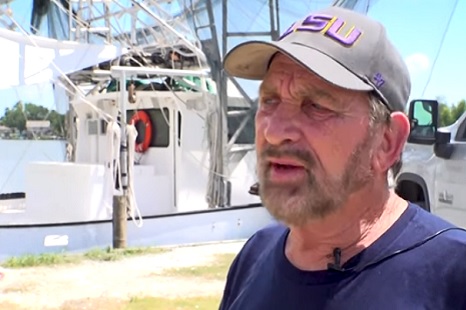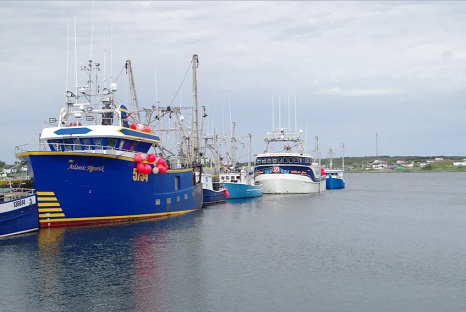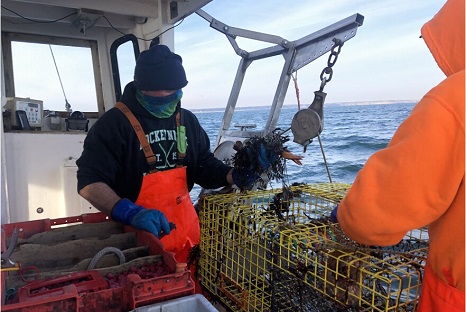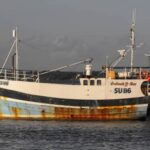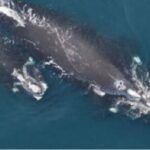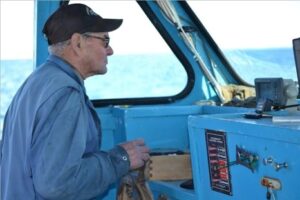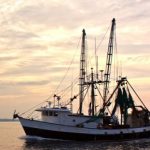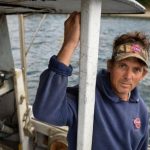Category Archives: Featured
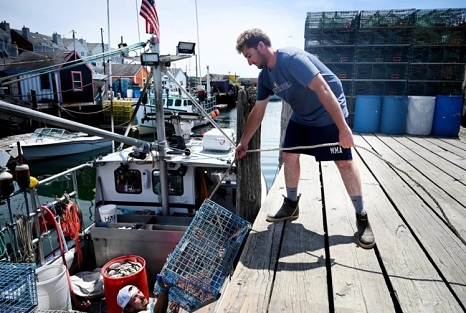
Economic destructive inflation: Falling wholesale prices put squeeze on Maine lobstermen
The price lobstermen got for their catches hovered around $8 a pound in 2021, which they said was one of their best years ever, with a plentiful haul, high prices and stable costs. This year, however, is shaping up to be one of the worst Maine lobstermen have faced in decades, with prices falling to about half of what they were last year. Prices have dropped by half and wholesalers say demand also is down sharply as inflation has weakened the economy and hurt the market for shellfish. With consumers paying high prices to fill up gas tanks and to buy groceries, lobsters are a luxury that 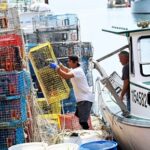 many cross off their shopping lists. Inflation is hitting lobstermen, too, particularly when they fill up fuel tanks before heading out to tend their traps. They say pretty much everything they need costs more this year, from fuel, oil and repairs for their engines to ropes and traps. Bait, too,,, photos, >click to read<
many cross off their shopping lists. Inflation is hitting lobstermen, too, particularly when they fill up fuel tanks before heading out to tend their traps. They say pretty much everything they need costs more this year, from fuel, oil and repairs for their engines to ropes and traps. Bait, too,,, photos, >click to read<
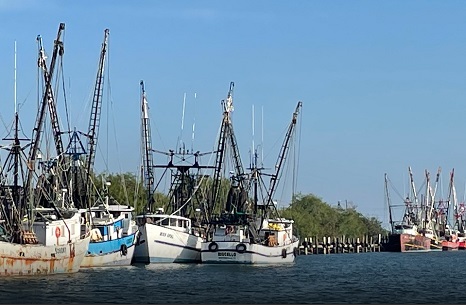
Texas: New shrimp season tangled up in regulations
That plate of fried shrimp people enjoy at a restaurant –whether locally or away from home – could either be taken off the menus or cost a lot more. The tastier Gulf shrimp caught by trawlers off the Texas Gulf Coast from the Brownsville/Port Isabel to the Palacios areas could also be replaced by farmed-raised crustaceans. That’s because this South Texas industry – one of the nation’s largest – is caught in the middle of a crisis caused by today’s U.S. immigration policies and by what is going on in countries south of Mexico. The expected arrival of hundreds of people who traditionally work on the boats, known as shrimp headers, is on halt right now; yet the kickoff of the 2022 season is about two weeks away. >click to read< 17:53
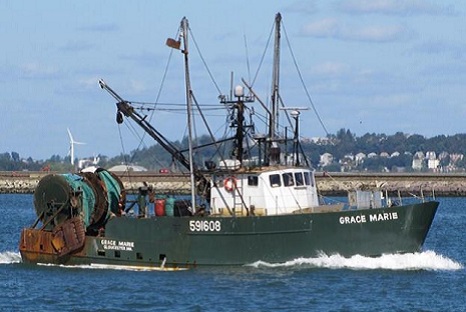
Good Samaritan vessel rescues 7 fishermen from Gloucester’s F/V Grace Marie
Seven fishermen were rescued by a good Samaritan fishing vessel after their vessel began taking on water Friday night. The crew of the Gloucester-based vessel Grace Marie issued a mayday around 10 p.m., saying the boat was taking on water and experiencing rapid flooding, according to Coast Guard Petty Officer Ryan Noel. The 65-foot fishing boat was about 80 nautical miles east of Gloucester. The Dawn T answered the call, according to the Coast Guard, and was able to bring all seven crewmen aboard and ferry them home. >click to read< photos@ Marine Traffic 07:32
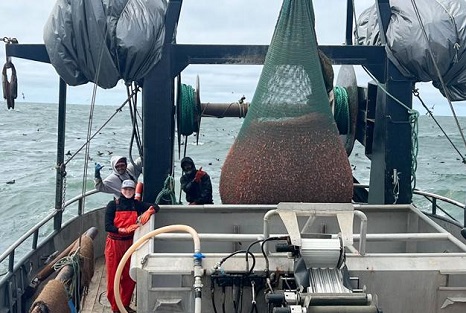
Floating offshore wind generator proposals worry fishing industry
From her home overlooking Yaquina Bay on the Oregon coast, Kelley Retherford can watch as commercial fishing boats arrive at the nearby Port of Newport, delivering their catch to one of several seafood processors that line the waterfront. Saltwater is in her family’s blood, she said. Along with her husband, Mike, and their four adult children, they own and operate four fishing trawlers, harvesting everything from Pacific whitefish and hake to pink shrimp and Dungeness crab. That way of life, however, may be disrupted by a growing interest in offshore wind generators to help achieve ambitious government-mandated zero-carbon energy goals. photos, >click to read< 18:50

NOAA – A Failed Agency
The Magnuson Act became the law of the land in 1977. Seven years later, the 200-mile limit between Canada and the United States was decided at the world court in the Hague, Netherlands. Both had good intentions, however both failed. Magnuson was supposed to keep fish stocks at a sustainable level and keep maritime communities, like Gloucester prosperous. It made sense. Plenty of fish meant plenty of fishing, processing and a strong waterfront economy. After NOAA Magnuson was signed into law and kicked out the foreign vessels, they contradicted their own intentions of “overfishing” and built up the American fleet by offering government-backed low interest loans. This set off a frenzy of boat building at a time when fish stocks were plentiful. The fleet doubled in size in less than a decade. This offset the gains made from keeping foreign vessels out. Well, it backfired. While we like to think that the foreign fleets raped our fish stocks, it was really NOAA’s’ misguided encouragement and failed policies. “Go get’em boys, it’s all ours now” was their signal to fishermen. >click to continue<, By Sam Parisi. Gloucester, Mass. 18:32
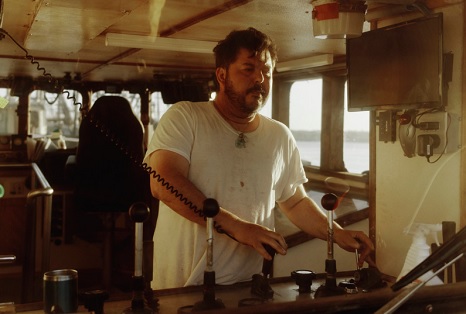
How Foreign Private Equity Hooked New England’s Fishing Industry
Before dawn, Jerry Leeman churned through inky black waters, clutching the wheel of the fishing vessel F/V Harmony. The 85-foot trawler, deep green and speckled with rust, was returning from a grueling fishing trip deep into the Atlantic swells. Leeman and his crew of four had worked 10 consecutive days, 20 hours a day, to haul in more than 50,000 pounds of fish: pollock, haddock and ocean perch, a trio known as groundfish in the industry and as whitefish in the freezer aisle. Leeman and his crew are barely sharing in the bounty. On deck, Leeman held a one-page “settlement  sheet,” the fishing industry’s version of a pay stub. Blue Harvest charges Leeman and his crew for fuel, gear, leasing of fishing rights, and maintenance on the company-owned vessel. Across six trips in the past 14 months, Leeman netted about 14 cents a pound, and the crew, about 7 cents each — a small fraction of the $2.28 per pound that a species like haddock typically fetches at auction. >Photos, click to read< 08:01
sheet,” the fishing industry’s version of a pay stub. Blue Harvest charges Leeman and his crew for fuel, gear, leasing of fishing rights, and maintenance on the company-owned vessel. Across six trips in the past 14 months, Leeman netted about 14 cents a pound, and the crew, about 7 cents each — a small fraction of the $2.28 per pound that a species like haddock typically fetches at auction. >Photos, click to read< 08:01
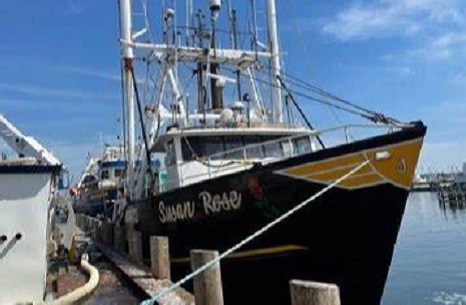
Coast Guard searching for a missing fisherman off the coast of Massachusetts
There is an active search underway off the Massachusetts coast Friday morning for a missing fisherman. The search is focused on a line between Nomans Island, which is just south of Martha’s Vineyard, and New Bedford. The Coast Guard says a crewmember from the fishing vessel F/V Susan Rose was last seen on board the boat at around midnight, and that the crew then realized he was no longer on the vessel at around 1:30 a.m. >click to read< , and >click here< 07:07
Coast Guard searches for man who went overboard off coast of Massachusetts – The U.S. Coast Guard Northeast said Friday that they are searching for a man who went overboard off the coast of Massachusetts. Fairhaven Harbormaster Timothy Cox said the active search started just after 2 a.m. on the track line between Noman’s Island and New Bedford. The vessel arrived in New Bedford at about 8 a.m. >click to read< 11:02
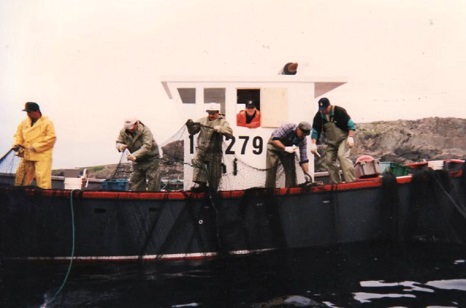
‘Like someone tore the guts out of me’: A look back in the 30 years since Crosbie shut down the cod fishery
Reg Butler, a 50-year-veteran fisherman from Bonavista, remembers those years well. The Butler family has a long history in the cod fishery in the town, a tradition being passed down from one generation to the next. Butler started going out fishing when he was nine. His father was a widow and had to take him out in the boat, along with his older brothers, because there was no one to take care of him. “When the moratorium was announced, everything was up in the air. Cod was our main source of income,” Butler said. “We had cod traps out. Who thought, when we took them in at the time, they’d never go in the water again? It was just like someone knocked the wind out of you. My father had fished up until he was in his 80s. The fish stocks were in decline, but it was still a shock to him, and us all, when it was shut down.” photos, >click to read< 08:26
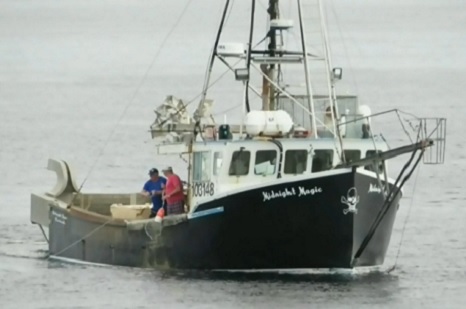
Catch of a lifetime: Sambro, N.S., fishermen harpoon swordfish in harbour
When the fishing boat Midnight Magic set sail on Friday, fishermen in Sambro, N.S., had little idea what kind of fish tale they would soon be able to share. For the first time in 41 years, a swordfish weighing more than 200 lbs was harpooned and hauled aboard the fishing vessel from the Sambro Harbour by fisherman Grant Garrison. Records show the last swordfish caught in those waters occurred on Aug. 21, 1981, by Paddy Grey. A newspaper that covered the event says that the fish weighed in at almost 600 lbs. >Video, newsclips, photos, click here< 18:20
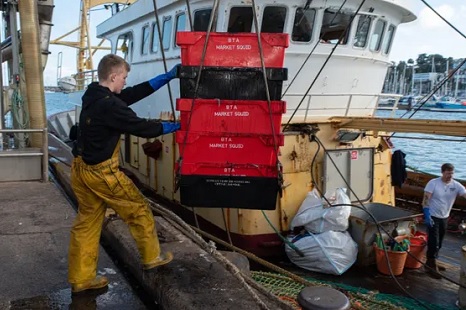
Rising diesel prices push UK’s fishing industry to the brink
Trawlers and commercial fishers are now struggling under the weight of price rises that mean in many cases tens of thousands of pounds extra in diesel for a fishing trip leading to take-home pay that is below the minimum wage. The biggest trawler in Brixham, the Julie of Ladram, returned to harbour after seven days at sea earlier this month, and came close to making a loss. The captain, Sean Beck, took home just £440 for a week’s work – the equivalent of £2.60 an hour for being responsible for the ship and crew 24 hours a day. “It’s a stressful time for my family. And it’s stressful at sea – fishing’s not always great. As a skipper it’s a big responsibility to make the boat pay and make sure everybody gets a wage.”>click to read< 09:42
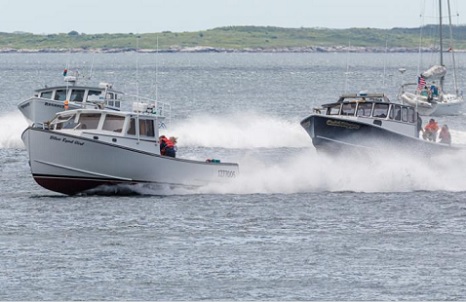
Taylor’s Blue Eyed Girl wins fastest working lobster boat
Andrew Taylor of Southport, owner of Blue Eyed Girl, defended his title as the Fastest Working Lobster Boat, at the Charles Begin Memorial Lobster Boat Races in Boothbay Harbor on Saturday, June 18. Forty boats competed in the first race of the Maine Lobster Boat Racing season. Taylor’s boat defeated three other competitors in the Fastest Working Lobster Boat race. His time was just over 47 mph. Taking second was Gold Digger, Heather Thompson, at 44 mph. Below are the results as provided by Jon Johansen, president of Maine Lobster Boat Racing. >click to read<, and review 64 excellent photos from Raceday! 08:12
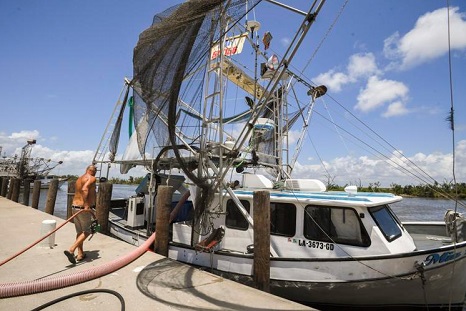
High fuel prices, cheap shrimp cripple Louisiana’s shrimping industry, still recovering from Ida
Nearly a year later, the residents there and other fishing villages along the coast have yet to fully recover. Record high fuel costs and low shrimp prices are making that recovery even more difficult. Darrell Domangue, 56, has been living in Cocodrie all his life and shrimping is all he has ever known. However, with shrimp going for 75 cents to $1 per pound and the cost of fuel increasing, he wonders if he will be able to pay back the $105,000 he borrowed to buy a new boat. The average price per gallon for diesel in Louisiana is now at $5.37, up from $2.91 a year ago, AAA data shows. 18 photos, >click to read< 08:50
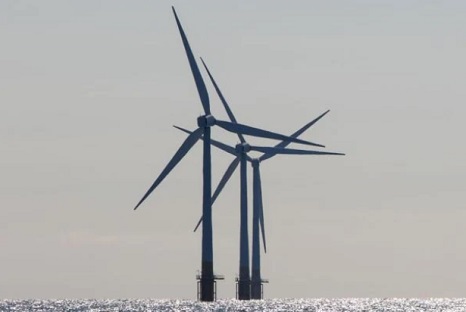
Martha’s Vineyard lobstermen oppose NOAA “incidental take” decision
Lobstermen Wayne Iacono and Wes Brighton expressed frustration at the “double-standard” that NOAA seems to be playing by giving Vineyard Wind an incidental “take” count. The Marine Mammals Protection Act defines take as “to harass, hunt, capture, or kill, or attempt to harass, hunt, capture, or kill any marine mammal.” Vineyard Wind is allowed some incidental take, which is “unintentional, but not unexpected, taking,” according to NOAA. One species, in particular, the lobstermen are worried about is the endangered North Atlantic Right Whale. >click to read< 15:41
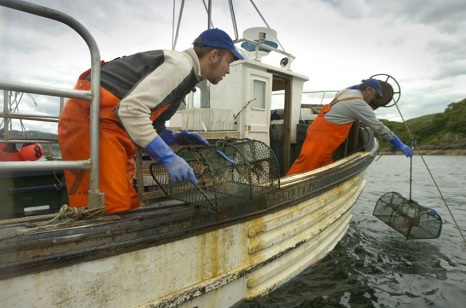
Firth of Clyde: Fishermen hit out at new measures aimed at protecting cod stocks
Exemptions allowing langoustine trawlers, creels and scallop dredgers to use the area during spawning season will be ended. The Clyde Fishermen’s Association says the move will have “a horrific impact”, but the government says it needs to act now to protect cod stocks. For 20 years, measures to protect spawning cod in the Firth of Clyde have been in place through an annual 11-week closure between February 14 and April 30. >click to read< 10:20
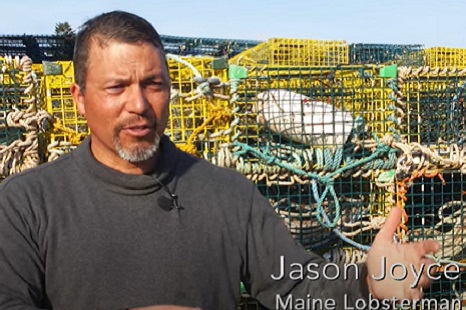
Video: Save the Gulf of Maine – The Maine Reset
Upcoming documentary scrutinizes plans to industrialize the Gulf of Maine and highlights the perspectives of the Mainers most affected. At the foreground of the conversation are Maine lobstermen. In later episodes, scientists and ecologists also weigh in. The result is a thought-provoking primer on an issue that could result in the fundamental transformation of the State of Maine. >click to watch<, 17:36 It’s only the beginning! You can support this project at www.igg.me/at/ProtectMaineWaters – Please, also watch the first video installment of >Road to Disaster – Voices of Maine Lobstermen, click here<
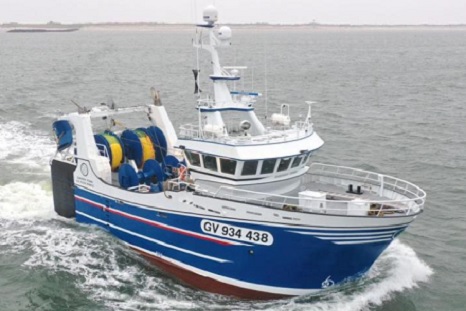
Brittany fishing company La Houle builds for the future
Brittany fishing company La Houle has been facing a case of invest or die, according to managing director Jacques Pichon, and a new addition marks the start of renewed investment in its fleet. The new trawler has raised a few eyebrows in St Guénolé, as its design is a departure from the usual French layout for vessels in this size bracket. La Houle went to Danish designer and shipbuilder Vestværft for its new trawler. Behind this decision is also La Houle’s ownership with Irish shareholders, including Niall Deasy who already runs two Vestværft-built trawlers of his own. photos, >click to read< 12:19
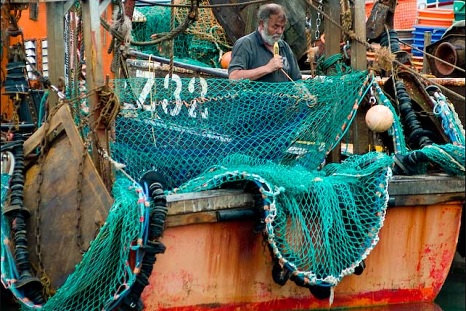
Newlyn: Grimmy Mike RIP.
There are, or rather were, two well-known skippers called Mike in Newlyn, both referred to by their ports of origin, Milford Mike and Grimmy Mike. Whilst Milford Mike is currently a contender for the oldest working fisherman in the port, sad news has reached Newlyn that Grimmy Mike has gone to the big wheelhouse in the sky. For those who are not aware, Mike Mahon, better known as Grimmy Mike became something of living legend in  Newlyn and beyond. The photo above epitomises Grimmy’s political fishing career – the little guy steaming ahead, singlehandedly trying to champion his beloved fishing industry battling against the full weight of legislation in the form the much-hated Common Fisheries Policy. Grimmy’s finest moment came when he sought the support of Canadian Fisheries minister, Brian Tobin who flew to Newlyn for the 1995 Fish Festival. photos,>click to read< 14:47
Newlyn and beyond. The photo above epitomises Grimmy’s political fishing career – the little guy steaming ahead, singlehandedly trying to champion his beloved fishing industry battling against the full weight of legislation in the form the much-hated Common Fisheries Policy. Grimmy’s finest moment came when he sought the support of Canadian Fisheries minister, Brian Tobin who flew to Newlyn for the 1995 Fish Festival. photos,>click to read< 14:47
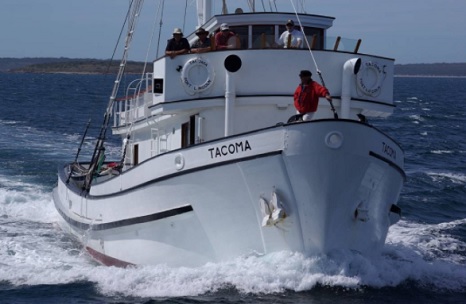
Tacoma’s 70 years: A personal perspective
Last month MFV Almonta sank on its mooring for a second time. This once proud member of the Port Lincoln tuna fleet now sits forlorn, half submerged in Porter Bay. It seems likely another part of the 60s tuna fleet is to be lost. I am guessing funds are short and too few people care enough to keep her afloat. This gives me pause for thought. A short distance away in the Marina sits the MFV Tacoma – afloat, fully preserved, debt free, self-funded and heritage listed. >click to read< 07:36
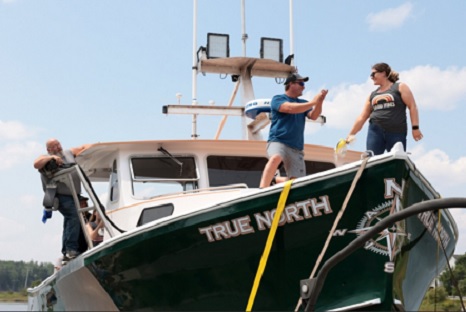
Patrice McCarron: Maine lobstermen are committed to protecting our ocean
In-depth, investigative reporting is increasingly rare these days. The resulting series, “The Lobster Trap” missed the boat, however, in its quest to invent a drama that places Maine’s lobster industry on the front line in the “battle over climate change.” From the lobster industry’s perspective, the series doesn’t accurately tell their story. Its seven key takeaways are disconnected from the people who were just a means to an end. This reporting dismisses, dehumanizes and minimizes fishermen’s role in mitigation and adaptation strategies, and it perpetuates a narrative that they are unwilling to engage in climate change conversations. >click to read< 09:21
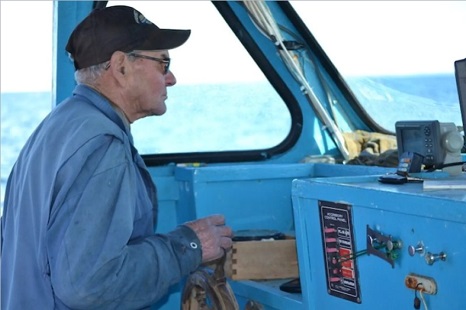
91-year-old active fisherman in P.E.I. to be inducted into Acadian Business Hall of Fame
For many people, eventual retirement is the force that pulls them to work every day, but for 91-year-old Alcide Arsenault, it’s a love of the sea. “In the spring, when the ice goes, it’s just like a magnet that takes you back to the shore. I’ve always loved fishing.” Alcide, who lives in Cape Egmont, has been fishing lobster off P.E.I.’s north and south shores since 1944 when he was just 14 and could be the oldest active fisherman in P.E.I. On Dec. 3, he was named one of four 2022 inductees into the Acadian Business Hall of Fame, considered the highest and most prestigious recognition from the Acadian and Francophone Chamber of Commerce of PEI. >click to read< 10:50
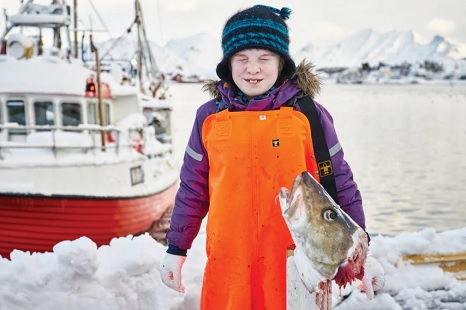
Norway: Kids Slice Out Cod Tongues for Serious Money
For as long as anybody can remember, tungeskjaererne have been responsible for the local cod tongue trade, even as fish factories give up the money they would otherwise get from the tongues by donating the fish heads to children and teenagers. The tradition introduces young people to the fishing industry and teaching them the value of entrepreneurship and hard work seems to matter more than making an extra kroner or two.The job makes selling Girl Scout cookies or running a lemonade stand look like child’s play. Arctander knows tungeskjaererne who have made more than $11,000 in a single season. “I haven’t thought of anything else in the world where kids can make so much money,”,,, >click to read< 08:34
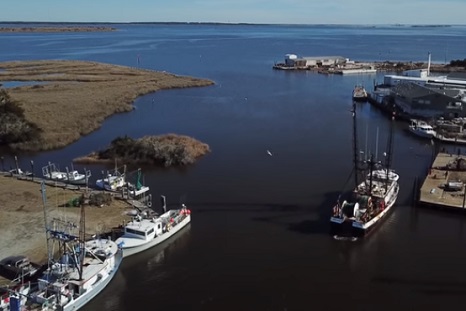
Safeguarding the Outer Banks’ commercial fishing heritage by supporting the livelihoods of local fishermen
Dare County has released a video titled, “Dare County’s Commercial Fishing Industry: Safeguarding the Community’s Longstanding Heritage by Supporting the Livelihoods of Local Fishermen,” as part of the county’s ongoing effort to inform members of the public as well as state and national legislators about the impact that increased regulation is having on the those who work within the commercial fishing industry. >Video, click to read< 10:11
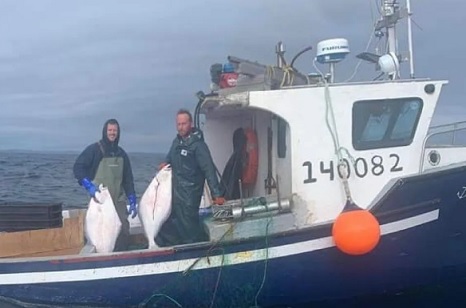
In Labrador, desperate pleas for search and rescue resources still unanswered
Dwight Russell can’t forget the apologetic words from one of the RCMP officers who came to his door on a Sunday evening in September. “We just don’t have the adequate resources to be able to do this,”,,, Mr. Russell’s son Marc Russell and his crewmate Joey Jenkins had been missing for two days after their boat failed to return to the wharf in Mary’s Harbour, a fishing community of about 350 people in southern Labrador. In this corner of Newfoundland and Labrador, where fishing is a lifeblood for many, the pair weren’t just missing fishermen, they were “Marc” and “Joey.” >click to read<, other related posts, >click here< 09:08
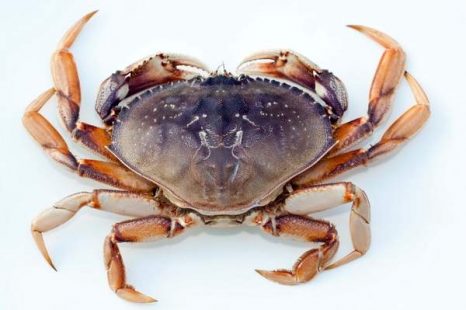
Premium prices no problem for shrimp, crab, lobster consumers
Global supply chain issues are affecting supplies of some crustaceans sold in US grocery stores, and driving some prices up, but consumers seem willing to pay extra for their “must have” shrimp, crab, lobster and other products. “Red king crab availability is very tight, so look for more snow crab or even golden king crab in its place,” Shrimp is far and away the best-selling seafood item in the United States, and Amdahl doesn’t see that changing anytime soon.,, Despite the logistics headaches that are slowing shipments of foods worldwide, US retailers can expect to have volumes of a variety of crustacean products from Norwegian fisheries,,, >click to read< 10:38

MAFMC and the ASMFC vote to screw commercial fishermen
Last week at the Atlantic States Marine Fishery Commission/ Mid Atlantic Fishery Management Council joint meeting these two management bodies voted to steal millions of dollars from the commercial fishing industry by reallocating historical quota from the commercial sector to the recreational sector. The two groups in charge of the management of Scup, Black Sea Bass and Summer Flounder voted to change the historic quotas of these species that were developed in the creation of their original management plan in the early 1990’s and used data from the 1980’s time period. Quota allocation is always a controversial issue whether it is within a fishery sector, [state by state quota] or between commercial and recreational interests. There always seems to be someone dissatisfied with the result. In regard to these three demersal species, the recreational sector was never satisfied with the results of the real data and have tried for over 25 years to change the allocations in their favor. >click to read< 07:25 By Jim Lovgren
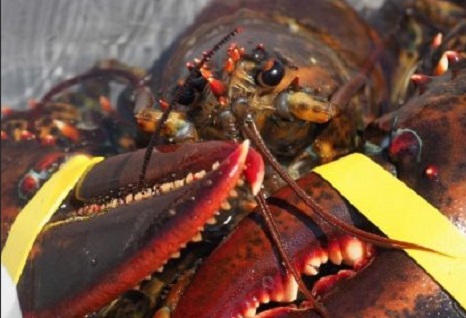
Maine’s lobster industry is in a fight for its survival
In October, a U.S. District Court judge in Bangor had ruled that there was reason to question the federal government’s decision to close this prime lobstering area for four months this winter. When an appeals court overturned this decision in November, lobstermen who had already set traps in this area were forced to dangerously hurry and take them up, creating economic hardship for those who invested in gear, rigged up and were already fishing in these productive waters. For Maine’s lobster industry, this is another frustrating example of one step forward, two steps back. This latest court ruling, however, is just the tip of the iceberg that threatens to sink the fishery. >click to read< 09:57
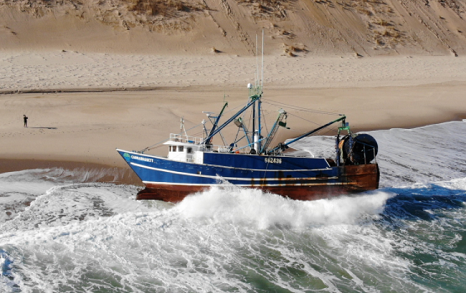
New Bedford Vessel Runs Aground on Longnook Beach
Part-time Truro resident Lynda West went with her father-in-law, Jock West, to Longnook Beach on Tuesday to take photos of the calm waters with his drone at low tide. “When we got here, I turned to him and said, ‘You hit the jackpot,’ ” Lynda said. “I’ve never seen anything like it.” At the bottom of the steep slope below the beach parking lot was a 78-foot blue-and-white groundfishing boat, the F/V Carrabassett, beached on the sand with one green light on and its radar dish spinning. “That’s not a good situation there,” said Provincetown fisherman Chris King, looking at the boat from the parking lot. >click to read< 09:48






